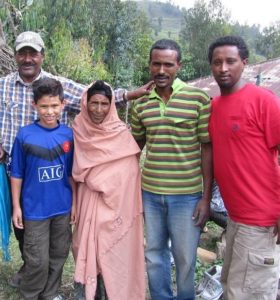In meeting new neighbors and working toward creating inclusive communities, we cannot fully understand what another person is dealing with, and we are also often unaware of stories that don’t get big news headlines or scroll across our screens. Political unrest, violence, and war affect our neighbors in ways that most of us have never experienced. Our neighbors are not only navigating the new and complex society we share but they may be experiencing family separation, witnessing current political unrest or violence streamed from their home country, and fearing for family members who are left behind. Or they may have lost contact with those family members due to violence and lack of resources. We invited Nile to share his family’s story and how the civil war in Ethiopia affects his family living in Nebraska. – Christa Yoakum, Senior Welcoming Coordinator.
********************************
This is a guest blog post by Nebraska Appleseed’s Welcoming Intern, Nile Debebe.
Hopeless
This is the one word I could use to describe how I am feeling about the safety of my family in the Amhara region of Ethiopia.
 Since July of 2020, the country has been embroiled in a horribly violent civil war based upon ethnic groups; with acts of ethnic cleansing occurring on both sides. Millions have been displaced, killed, tortured, and raped. Right now, every single day, Tigray and Amhara Ethiopians, men, women, and children, are killed in this war. While both sides blame each other for the ongoing war, Ethiopian citizens ultimately pay the price.
Since July of 2020, the country has been embroiled in a horribly violent civil war based upon ethnic groups; with acts of ethnic cleansing occurring on both sides. Millions have been displaced, killed, tortured, and raped. Right now, every single day, Tigray and Amhara Ethiopians, men, women, and children, are killed in this war. While both sides blame each other for the ongoing war, Ethiopian citizens ultimately pay the price.
My father would usually send money back on a monthly basis to our family in Ethiopia; and I cannot tell you how many times I have heard my father yelling in Amharic over the phone, with an international calling card on his lap. A few days ago this week, my father looked awfully distraught. When I asked him what was going on, he mentioned that our Uncle had told him that rebel forces had come to their home village; and that our entire family had to flee far into the mountains, where cell phone coverage would not reach. My father did not need to tell me that he didn’t know whether our family was alive or dead, I realized it because of the look on his face.
 I cannot tell you the pain of having a side of my family that I never got to know; an entire side of my identity that has been erased from my memory because of harmful, outdated immigration laws. When my half-brothers applied for immigration status back in 2009, they were both rejected by the U.S. State Department, without reason. They had both already been accepted to the University of Nebraska-Lincoln (UNL) to begin studying undergraduate degrees, completed all immigration documentation, and we’re looking forward to a new life with us here in Nebraska. I now have to deal with the thought of them getting caught up in this war; possibly to die, and never meet me again.
I cannot tell you the pain of having a side of my family that I never got to know; an entire side of my identity that has been erased from my memory because of harmful, outdated immigration laws. When my half-brothers applied for immigration status back in 2009, they were both rejected by the U.S. State Department, without reason. They had both already been accepted to the University of Nebraska-Lincoln (UNL) to begin studying undergraduate degrees, completed all immigration documentation, and we’re looking forward to a new life with us here in Nebraska. I now have to deal with the thought of them getting caught up in this war; possibly to die, and never meet me again.
There is nothing that I can do except hope and pray that my family will make it out of this war. I hope that this blog might help spread knowledge about the war in Ethiopia; and that people who read this pressure their representatives to both support positive immigration reform, and to influence the United Nations (UN) in intervening in this conflict.
********************************
Learn more about how to support positive immigration laws and how they would make a big impact for local families and communities. Visit the Nebraska statewide story & take action website.
You can also donate to the Ethiopia Humanitarian Fund run by the United Nations.

